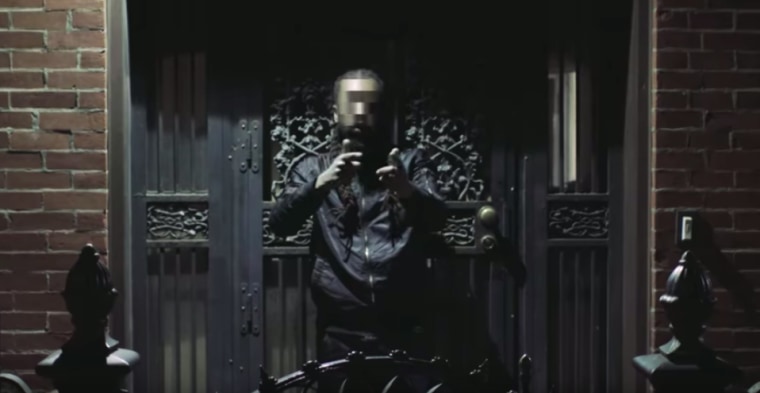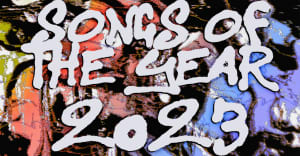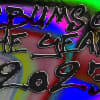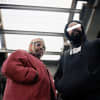
Less than ten minutes into his new album, Hiding Places, the Brooklyn-based rapper billy woods is inviting you to imagine the notebooks of huddled, self-satisfied social scientists watching “negroes sell dope”:
“‘Hand-to-hand, much as their forefathers before
It’s a good trope...
Fascinating stuff’”
The song that scene is from, “Spider Hole,” is a clean distillation of a few of the record’s key themes: the way hidden behaviors come to light and the way people try to keep them obscured; the things people leave unsaid, even to their closest friends and family; and the urge to free yourself from those ties entirely.
woods –– who does not show his face in press photos or videos unless it’s obscured by a mask or by digitized fuzz –– has put out five solo albums in a seven-year span, along with four records with Elucid, as Armand Hammer. It’s a dizzyingly prolific run, impressive not only for the volume of inventive, expertly-written rap songs but for the way the albums delineate themselves, each distinct in shape and theme. The new record is woods’s leanest and his best, both when it leans into detailed character sketches and when it lashes out misanthropically, as it does on the “Spider Hole” chorus: “I wouldn’t be caught dead with most of y’all / ‘Don't call me again’ –– what I'll say when you call.”
Hiding Places stays coiled tightly around its title. It tucks itself behind curtains where men’s hands shake as they sweatily loading shotguns; into pulled-over cars, trembling, hoping the cops don’t find the trap door; into the crevices where Mom keeps the passports hidden; outside of hotels waiting for Reagan to show up and work the rope line; all the way to the dim arcade room at a dollar-movie theatre, fingering the joystick while there’s no money in the machine. The narrators of the songs are too nervous to finish their books, so they strip them for parts, or they’re stubbornly tethered to the past, or they’re comfortable letting old friends drift into the ether.
Often this hiding is tied to a sort of physical decay. It’s there on the album cover –– an apparently vacant house that looks as if it’s going to crumble in on itself any second. The actual spaces woods’s narrators occupy are childhood homes that feel smaller on a second pass, cars that are drifting on ice before a violent impact, in corner stores, making overseas phone calls on choppy connections. Kids liberated from their parents ram shopping carts into one another and tear apart corner stores. You imagine, even without provided description, that the social workers’ offices he puts you in have paint peeling off the walls. The spider holes could be the one a broken Saddam was fished out of or the ones from the nature documentaries, hairy arachnids popping out from beneath matted shields of dead leaves. On the record’s first song, “Spongebob,” woods handwaves away all the things: someone has “the nerve to say ‘You can’t take it with ya’ / Fuck would I want with any of this shit? / Dummy?”
“Spider Hole” opens in a crawlspace, the narrator trying to control his breathing, mercenaries at the gate. But it also departs from the album’s broader motif of literal, physical disintegration and turns its focus to modern conveniences and upper-class sheen. From its chorus:
“Broad smile, copping legal weed from fake hole-in-the-wall
I don’t wanna go see Nas with an orchestra at Carnegie Hall”
Kenny Segal, a pivotal figure in the last decade-plus of L.A.’s rap underground, produced Hiding Places in its near-entirety. He gives its opening four-song suite razor teeth, with snarling, serrated guitars. (This is before the album, briefly, smooths out: into “Houthi,” which sounds deceptively like a lullaby, and “A Day in a Week in a Year,” which is chilling but silky.) The effect is aggressive and foreboding.
What “Spider Hole” does so well is cast things might otherwise go unexamined as absurd: the anthropologists taking notes, the men stuffing themselves into tuxedos to hear a neutered version of “One Love,” the glossy ads for CBD oil. woods has always been good at this –– or at making fantastical things seem as mundane as they really are, like he does in the song’s second verse:
“First time I saw them put a trap in the car — eyes wide
Felt like the internet, snipers in the minaret
Little tiny spoon for the mignonette
...the job was to sit there all day and press refresh”
It’s enough to make you want to shut off your phone for good.


